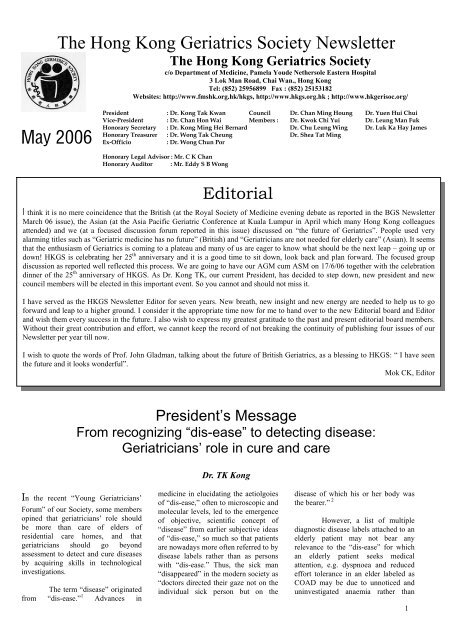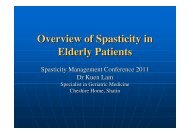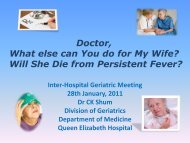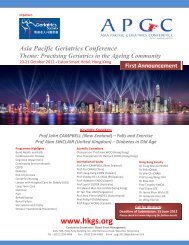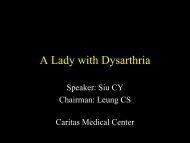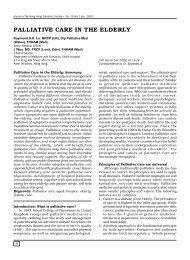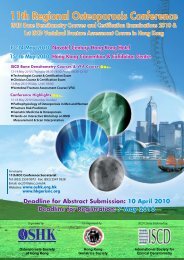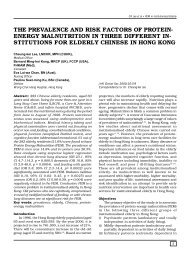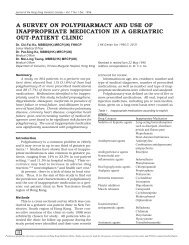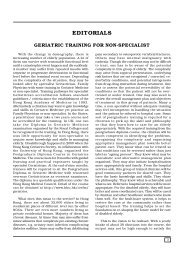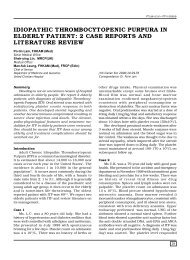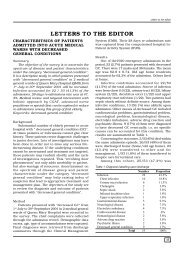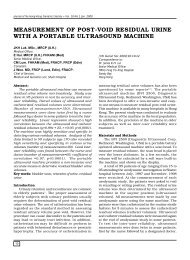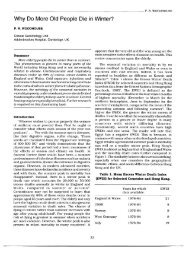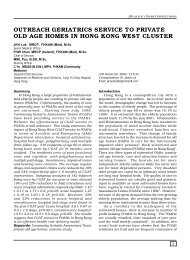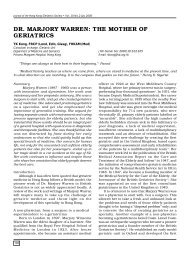The Hong Kong Geriatrics Society Newsletter May 2006
The Hong Kong Geriatrics Society Newsletter May 2006
The Hong Kong Geriatrics Society Newsletter May 2006
Create successful ePaper yourself
Turn your PDF publications into a flip-book with our unique Google optimized e-Paper software.
<strong>The</strong> <strong>Hong</strong> <strong>Kong</strong> <strong>Geriatrics</strong> <strong>Society</strong> <strong>Newsletter</strong><br />
<strong>The</strong> <strong>Hong</strong> <strong>Kong</strong> <strong>Geriatrics</strong> <strong>Society</strong><br />
c/o Department of Medicine, Pamela Youde Nethersole Eastern Hospital<br />
3 Lok Man Road, Chai Wan., <strong>Hong</strong> <strong>Kong</strong><br />
Tel: (852) 25956899 Fax : (852) 25153182<br />
Websites: http://www.fmshk.org.hk/hkgs, http://www.hkgs.org.hk ; http://www.hkgerisoc.org/<br />
<strong>May</strong> <strong>2006</strong><br />
President : Dr. <strong>Kong</strong> Tak Kwan Council Dr. Chan Ming Houng Dr. Yuen Hui Chui<br />
Vice-President : Dr. Chan Hon Wai Members : Dr. Kwok Chi Yui Dr. Leung Man Fuk<br />
Honorary Secretary : Dr. <strong>Kong</strong> Ming Hei Bernard Dr. Chu Leung Wing Dr. Luk Ka Hay James<br />
Honorary Treasurer : Dr. Wong Tak Cheung Dr. Shea Tat Ming<br />
Ex-Officio<br />
: Dr. Wong Chun Por<br />
Honorary Legal Advisor : Mr. C K Chan<br />
Honorary Auditor : Mr. Eddy S B Wong<br />
Editorial<br />
I think it is no mere coincidence that the British (at the Royal <strong>Society</strong> of Medicine evening debate as reported in the BGS <strong>Newsletter</strong><br />
March 06 issue), the Asian (at the Asia Pacific Geriatric Conference at Kuala Lumpur in April which many <strong>Hong</strong> <strong>Kong</strong> colleagues<br />
attended) and we (at a focused discussion forum reported in this issue) discussed on “the future of <strong>Geriatrics</strong>”. People used very<br />
alarming titles such as “Geriatric medicine has no future” (British) and “Geriatricians are not needed for elderly care” (Asian). It seems<br />
that the enthusiasm of <strong>Geriatrics</strong> is coming to a plateau and many of us are eager to know what should be the next leap – going up or<br />
down! HKGS is celebrating her 25 th anniversary and it is a good time to sit down, look back and plan forward. <strong>The</strong> focused group<br />
discussion as reported well reflected this process. We are going to have our AGM cum ASM on 17/6/06 together with the celebration<br />
dinner of the 25 th anniversary of HKGS. As Dr. <strong>Kong</strong> TK, our current President, has decided to step down, new president and new<br />
council members will be elected in this important event. So you cannot and should not miss it.<br />
I have served as the HKGS <strong>Newsletter</strong> Editor for seven years. New breath, new insight and new energy are needed to help us to go<br />
forward and leap to a higher ground. I consider it the appropriate time now for me to hand over to the new Editorial board and Editor<br />
and wish them every success in the future. I also wish to express my greatest gratitude to the past and present editorial board members.<br />
Without their great contribution and effort, we cannot keep the record of not breaking the continuity of publishing four issues of our<br />
<strong>Newsletter</strong> per year till now.<br />
I wish to quote the words of Prof. John Gladman, talking about the future of British <strong>Geriatrics</strong>, as a blessing to HKGS: “ I have seen<br />
the future and it looks wonderful”.<br />
Mok CK, Editor<br />
President’s Message<br />
From recognizing “dis-ease” to detecting disease:<br />
Geriatricians’ role in cure and care<br />
Dr. TK <strong>Kong</strong><br />
In the recent “Young Geriatricians’<br />
Forum” of our <strong>Society</strong>, some members<br />
opined that geriatricians’ role should<br />
be more than care of elders of<br />
residential care homes, and that<br />
geriatricians should go beyond<br />
assessment to detect and cure diseases<br />
by acquiring skills in technological<br />
investigations.<br />
<strong>The</strong> term “disease” originated<br />
from “dis-ease.” 1 Advances in<br />
medicine in elucidating the aetiolgoies<br />
of “dis-ease,” often to microscopic and<br />
molecular levels, led to the emergence<br />
of objective, scientific concept of<br />
“disease” from earlier subjective ideas<br />
of “dis-ease,” so much so that patients<br />
are nowadays more often referred to by<br />
disease labels rather than as persons<br />
with “dis-ease.” Thus, the sick man<br />
“disappeared” in the modern society as<br />
“doctors directed their gaze not on the<br />
individual sick person but on the<br />
disease of which his or her body was<br />
the bearer.” 2<br />
However, a list of multiple<br />
diagnostic disease labels attached to an<br />
elderly patient may not bear any<br />
relevance to the “dis-ease” for which<br />
an elderly patient seeks medical<br />
attention, e.g. dyspnoea and reduced<br />
effort tolerance in an elder labeled as<br />
COAD may be due to unnoticed and<br />
uninvestigated anaemia rather than<br />
1
COAD; functional decline and fever in<br />
Health professionals who<br />
interactions. In the words of Bernard 1. Porter R. What is Disease? In:<br />
Isaacs, “Elderly patients are admitted Porter R (ed). <strong>The</strong> Cambridge<br />
to hospital not because of social Illustrated History of Medicine.<br />
problems, but because of medical Cambridge: Cambridge University<br />
problems with social consequences, or Press,1996: 82.<br />
social problems with medical 2. Jewson ND. <strong>The</strong> disappearance of<br />
consequences.” Geriatric assessment is the sick man from medical<br />
a process of knowing the elderly cosmology, 1770-1870. Sociology<br />
person: recognizing “dis-ease”; 1976; 10: 225-244.<br />
detecting causative diseases and 3. <strong>Kong</strong> TK. Elucidating sleep<br />
environmental factors (drugs, social); problems: from “dis-ease” to<br />
matching “dis-ease” to diseases; in disease. <strong>Hong</strong> <strong>Kong</strong> <strong>Geriatrics</strong><br />
order that “dis-ease” can be reversed <strong>Society</strong> Interhospital Geriatric<br />
or reduced through appropriate Meeting, 28 Apr <strong>2006</strong>. Online.<br />
interventions, thus protecting a frail Available:<br />
elder from functional decline and ftp://hkgs.org.hk/public_html/HK<br />
institutional placement. But all these GS-IHM060428-<strong>Kong</strong>TKwill<br />
be largely theoretical if our health Elucidating%20Sleep%20Problem<br />
care system and evidence-base remains s.pdf Accessed 13 <strong>May</strong> <strong>2006</strong>.<br />
biased towards singular disease and 4. Tinnetti ME, Bogandus ST Jr,<br />
fragmented into single organ-system Agostin JV. Potential pitfalls of<br />
approach. 4-6 disease specific guidelines for<br />
another elder labeled as “UTI” may be<br />
due to undiagnosed gouty arthritis<br />
have, or are caring for, parents with<br />
acute and chronic “dise-ease,” often<br />
precipitated by diuretics used in experiencing heartache and hardship,<br />
treating heart failure. Mis-labelling and understand the limitations of our<br />
mismatching of the relationships current health care system as applied to<br />
between “dis-ease” and disease may elderly patients.<br />
7-11<br />
Scarred by the<br />
deny an elder a chance of cure, e.g. an undignified hospital experience of his<br />
elderly lady with instability and mother, a doctor wrote, “It has<br />
impaired cognition being denied an<br />
operation for subdural haematoma<br />
because of the diagnostic label of<br />
something to do with lack of resources,<br />
but I suspect more to do with lack of<br />
professional self worth and care by<br />
dementia, ignoring that subdural isolated individuals rather than a<br />
haematoma could be a reversible cause coherent team.” 7 Frustrated and<br />
of cognitive decline. “Dis-ease” in an inspired by their own experience of<br />
elder may remain hidden from the being caregivers of parents, 9 Robert<br />
attending doctor because of lack of and Rosalie Kane, themselves<br />
appropriate attitude, knowledge and knowledgeable geriatrician and<br />
skills in geriatric medicine, e.g. gerontologist, formed the lobbying<br />
problems of incontinence, instability organization, “Professionals With<br />
and falls, and insomnia are ignored or<br />
just treated palliatively. It is often<br />
Personal Experience in Chronic Care”<br />
in the U.S., and voiced out to<br />
forgotten that such geriatric problems policymakers, “If professionals<br />
can have reversible causes and can at<br />
times be cured through detection and<br />
working within the health care system<br />
are having serious problems with<br />
treatment of underlying diseases. 3 If getting care for themselves and their<br />
“dis-ease” is not recognized, a families, then the system is failing in a<br />
diagnostic pathway won’t occur, and major way.” 12<br />
an elder might be labeled as “social<br />
problem,” and the solution thought to<br />
be social or institutional care. <strong>The</strong><br />
dichotomous view of an elder with<br />
“dis-ease” as either “medical” or<br />
“social” would not fit into her fragile<br />
ecosystem of diseases, drugs and<br />
<strong>The</strong>re is much that we can do<br />
as geriatricians, by education and by<br />
examples, to strive for a better model<br />
and system of medical and social care<br />
to match the needs of elderly people<br />
with “dis-ease.”<br />
adverse social factors with complex<br />
patients with multiple conditions.<br />
N Engl J Med 2004; 351: 2870–<br />
2874.<br />
5. Rockwood K, Hubbard R. Frailty<br />
and the geriatrician. Age Ageing<br />
2004; 33(5): 429–430.<br />
6. Hubbard RE, O’Mahony MS,<br />
Cross E, et al. <strong>The</strong> ageing of the<br />
population: implications for<br />
multidisciplinary care in hospital.<br />
Age Ageing 2004; 33: 479–482.<br />
7. Chamberlain MJ. Personal views:<br />
Please don’t make a fuss, dear. Br<br />
Med J 1997; 315:1100-1101.<br />
Online.<br />
Available:<br />
http://bmj.bmjjournals.com/cgi/co<br />
ntent/full/315/7115/1100/a<br />
Accessed 16 Jan 1998.<br />
8. Winakur J. What are we going to<br />
do with dad? Health Aff<br />
(Millwood) 2005; 24(4):1064-<br />
1072. Online. Available:<br />
http://content.healthaffairs.org/cgi/<br />
content/full/24/4/1064 Accessed<br />
13 <strong>May</strong> <strong>2006</strong>.<br />
9. Gross J. When Experts Need<br />
Experts. New York Times.<br />
November 10, 2005. Online.<br />
Available:<br />
http://www.nytimes.com/2005/11/<br />
10/garden/10old.html?ex=114766<br />
5600&en=0f19c86e36f8b721&ei=<br />
5070 Accessed 13 <strong>May</strong> <strong>2006</strong>.<br />
10. Sherman FT. This geriatrician's<br />
greatest challenge: caregiving.<br />
<strong>Geriatrics</strong> <strong>2006</strong>; 61(3): 10-11.<br />
Online.<br />
Available:<br />
http://www.geri.com/geriatrics/arti<br />
cle/articleDetail.jsp?id=312526<br />
Accessed 7 <strong>May</strong> <strong>2006</strong>.<br />
11. Barrett EE. Fighting a system<br />
biased toward nursing home<br />
placement. J Am Geriatr Soc <strong>2006</strong>;<br />
54(3): 541-542.<br />
12. Professionals With Personal<br />
Experience in Chronic Care<br />
(PPECC). Online. Available:<br />
http://www.ppecc.org/ Accessed<br />
13 <strong>May</strong> <strong>2006</strong>.<br />
2
Provisional draft program of<br />
the <strong>Hong</strong> <strong>Kong</strong> <strong>Geriatrics</strong> <strong>Society</strong> 25th Anniversary cum Annual Scientific Meeting<br />
17th June <strong>2006</strong>, Sheraton Hotel<br />
12:30-14:00 Registration and Lunch<br />
14:00-15:00 Free Paper Presentation (Competition for Chan Sik, YY Ng & NS Ng Prizes)<br />
15:00-15:30 Annual General Meeting<br />
15:30- 16:00 Health Break<br />
16:00-17:30 Old Age Psychiatry Symposium on Dementia, Delirium & Depression<br />
Prof. Roy Jones (Bath), Dr. Jim George (Carlisle)& Prof S W Tang (HKU)<br />
17:30-17:45 Opening ceremony and welcome addresses<br />
Hon Dr Leong Chi Hung, Dr. TK <strong>Kong</strong>, Dr. Felix Chan<br />
17:45-19:15 Plenary Symposium on Geriatric Medicine: Past, Present and Future<br />
Prof. David Stott (Glasgow), Dr. HC Tam (Australia), Dr. YC Lee (NewZealand)<br />
19:15-22:00 Jubilee Annual Dinner<br />
Gold Medal Awards and Outstanding Free Paper Awards Presentation /<br />
Performances/Games/Lucky Draw<br />
Council news<br />
Dr Bernard <strong>Kong</strong><br />
1. “<strong>Hong</strong> <strong>Kong</strong> <strong>Geriatrics</strong> <strong>Society</strong> Curriculum in Geriatric Medicine”: 2000 copies have been printed and sold at<br />
HK$300 in the McBarron bookshop for non-members. Members can get a copy at HK$100 from HKGS.<br />
2. DGM will be held in SH on 15/6/06 and PDGM in KWH & TKOH on 13-14/6/06. <strong>The</strong> PDGM examination format<br />
in June 06 will change to that similar to the DGM.<br />
3. Asia Pacific Geriatric Conference in April <strong>2006</strong>: TK <strong>Kong</strong>, MF Leung, J Woo and B <strong>Kong</strong> were invited as speakers<br />
representing <strong>Hong</strong> <strong>Kong</strong> (photo 1). It was well organized with sharing between specialists from Australia,<br />
NewZealand, Malaysia, Singapore, Thailand and Indonesia. An Asia Pacific Network in Geriatric Medicine has been<br />
set up with a web site run by Australian <strong>Society</strong> For Geriatric Medicine. <strong>The</strong> next APGC will be held in Beijing in<br />
October, 2007. It is planned to have parallel conference with the Asian/Oceania Congress of Gerontology meeting.<br />
4. Annual Outing on 5/3/06: members and their families enjoyed a good day.<br />
5. ASM/AGM <strong>2006</strong> – see separate notice.<br />
6. Dr. TK <strong>Kong</strong> will step down from Presidency in June. A five-member election committee was set up for the AGM –<br />
TK <strong>Kong</strong> (Chairman), F Chan, B <strong>Kong</strong>,, TC Wong and CP Wong.<br />
7. HKGS 25th Anniversary: Jubilee Dinner – core group led by B <strong>Kong</strong> for the logistics. An editorial board with CM<br />
Lum as editor in chief will publish a book to commemorate the occasion. Board members are: KS Au, F Chan, PS<br />
Ko, B <strong>Kong</strong>, KK Mo, CK Mok, FC Pang, B Sheng.<br />
8. Progress on Combining JHKGS and JHKAG: T Kwok and MF Leung are co-editors of the new “Asian Journal of<br />
Gerontology and <strong>Geriatrics</strong>” – planned for 3 publications in <strong>2006</strong>, then 4 per year from 2007 onwards. <strong>The</strong> first issue<br />
will be out by end of <strong>May</strong>. <strong>The</strong> 1st inaugural issue will be free to members of HKGS, HKCP, HKCFM and Psychogeriatricians.<br />
9. Three council members (TK <strong>Kong</strong>, T Kwok, TC Wong) together with Prof. J Woo met Professor Finbarr Martin<br />
(consultant physician at the elderly care unit at Guy's and St.Thomas' NHS Foundation Trust in London, Chair of the<br />
BGS Section on Fall and Bone health.) on 25/4/06 at Regal Seafood Restaurant, Regal Riverside Hotel (photo 2).<br />
10. NS Ng, F Chan and a team of geriatricians attended the Canadian <strong>Geriatrics</strong> <strong>Society</strong> 25 th Anniversary cum Annual<br />
Scientific Meeting in Vancouver (photo 3). On behalf of HKGS, NS Ng presented a souvenir (the <strong>Hong</strong> <strong>Kong</strong><br />
<strong>Geriatrics</strong> <strong>Society</strong> Curriculum in Geriatric Medicine) to the Canadian <strong>Geriatrics</strong> <strong>Society</strong>.<br />
3
Future of HK <strong>Geriatrics</strong> Forum<br />
Reported by Mok CK,Moderator of the Forum<br />
A forum on “Future of <strong>Hong</strong> <strong>Kong</strong><br />
<strong>Geriatrics</strong> – 20 years forward” was held<br />
on 16/3/06 at Ruttonjee Hospital by<br />
HKGS. This is part of the celebration<br />
activities of the 25 th anniversary of<br />
HKGS. 17 HKGS members attended the<br />
meeting with a good mix of “old” and<br />
“young’ colleagues working in<br />
geriatrics. A few who could not come<br />
had expressed their points through e-<br />
mail. <strong>The</strong> following is a brief summary<br />
of the points noted in the meeting. Some<br />
viewpoints are very different or even<br />
contrasting to each other. However,<br />
they reflected the diversity of our<br />
members’ view on our specialty.<br />
Image of <strong>Geriatrics</strong><br />
• <strong>Geriatrics</strong> has a general good<br />
image & is trusted by both formal<br />
and informal care-givers.<br />
• Some doctors have a low image<br />
of <strong>Geriatrics</strong> including geriatric<br />
colleagues themselves.<br />
• Some equate ‘<strong>Geriatrics</strong>” to “Old<br />
Age Home” medicine –<br />
considered as a negative image.<br />
• Some have positive regards<br />
towards the <strong>Geriatrics</strong> specialty;<br />
geriatricians are no less capable<br />
than general medical colleagues<br />
and geriatrics have her special<br />
contribution to frail elderly<br />
patients.<br />
• Some successful colleagues<br />
thought that image was built up<br />
by effort – contribution to<br />
difficult case management,<br />
hospital service planning &<br />
administration etc.<br />
• Some have the impression that<br />
the current geriatric service pays<br />
too much emphasis on population<br />
health, policy making and public<br />
health service provision.<br />
• A proposal to promulgate the<br />
image of <strong>Geriatrics</strong>: the mission<br />
of geriatric training is to train<br />
CARING doctors to be the BEST<br />
physicians for FRAIL elderly<br />
persons in DIFFERENT medical<br />
settings; Geriatricians are the best<br />
physicians for frail older patients.<br />
• Propaganda in the media is<br />
needed to spread our knowledge<br />
and message to the public which<br />
in turn can uplift our public<br />
image; need to uplift the image of<br />
<strong>Geriatrics</strong> to both the professional<br />
(Geri & non-Geri) and lay people.<br />
• Geriatricians, with a strong<br />
background of holistic approach<br />
to disease management, should<br />
take up active roles in service<br />
planning, administration and<br />
monitoring in hospitals which in<br />
the long term can build up the<br />
prestige of <strong>Geriatrics</strong>.<br />
• Role models (academic,<br />
administration, service provision)<br />
are always in need to boost up the<br />
morale of a specialty.<br />
• A strong knowledge basis of<br />
general medicine is a strong<br />
promoter of self-image & respect<br />
from others; “Knowing<br />
something of everything” is<br />
important.<br />
• Some considered <strong>Geriatrics</strong><br />
taking a passive role in hospital<br />
service. But some commented<br />
that actually one could be very<br />
active e.g. running A&E liaison,<br />
orthogeriatric services etc.<br />
Whether the specialty is active or<br />
not depends on the attitude of the<br />
team and their relationship with<br />
other specialties.<br />
Public Private interface<br />
• Survival in private market – as in<br />
many specialties, private<br />
specialists need to do general<br />
medical. For <strong>Geriatrics</strong>, just doing<br />
assessment is not enough, need to<br />
run disease model and treatment<br />
model for business.<br />
• Public service support<br />
(multidisciplinary support) to<br />
private geriatricians can be very<br />
helpful e.g. direct referral to GDH,<br />
admission right (bypass the long<br />
queue of specialist OPD new case<br />
booking) etc.<br />
• Recognition of the geriatric<br />
specialty by both HK people and<br />
professional colleagues of other<br />
specialties is crucial for<br />
successful private practice.<br />
• Group practice is a trend in the<br />
private market; this can be a<br />
better model of geriatric practice<br />
in private.<br />
Training and staff recruitment<br />
• Centralized training program was<br />
suggested, using inter-hospital<br />
meeting as a possible means. Our<br />
HPT curriculum could be used as<br />
the backbone of the presentations<br />
including basic knowledge and<br />
current updates; sharing of<br />
service delivery models and<br />
experience to young geriatricians<br />
was also suggested e.g. how to set<br />
up dementia clinic, continence<br />
clinic etc.<br />
• Some thought that the current low<br />
image of <strong>Geriatrics</strong> in some<br />
hospitals deterred recruitment of<br />
new staffs/trainees.<br />
• Hi-tech and Hi-skill are not the<br />
characteristics of <strong>Geriatrics</strong>;<br />
<strong>Geriatrics</strong> requires a different set<br />
of skill-mix.<br />
• For some low risk investigation &<br />
procedures e.g. dysphagia<br />
assessment, PEG insertion etc.,<br />
geriatricians may be at a good<br />
position to pick up the skills and<br />
deliver the service. This is to be<br />
considered with the local settings<br />
in individual hospitals and the<br />
relationship with other<br />
subspecialties.<br />
• For technical skill training, interdepartmental<br />
transfer of staff for<br />
attachment is to be encouraged &<br />
facilitated.<br />
• Some considered that the<br />
knowledge on the core business<br />
of <strong>Geriatrics</strong> is probably not<br />
thoroughly known by many<br />
geriatric doctors (even trained<br />
ones) – further improvement in<br />
this situation is needed.<br />
• Some suggested 3 rd specialty<br />
training but most thought that<br />
<strong>Geriatrics</strong> + AIM is good enough;<br />
a 3 rd specialty just diverge the<br />
attention & effort from <strong>Geriatrics</strong>.<br />
4
• Our holistic approach to elderly<br />
health problems is never to be<br />
compromised. Such approach<br />
actually helps us to make quick<br />
and good clinical judgment and<br />
decision in our daily practice e.g.<br />
discharge planning, appropriate<br />
Ix and Mx etc.<br />
• For trained geriatricians, more<br />
chance to take up supervisory role<br />
in service development and<br />
delivery is important for staff<br />
development.<br />
• Good role models seen by<br />
medical students have big<br />
influence in their future choice of<br />
clinical subspecialties.<br />
• As geriatric service has many<br />
faces, multiple types of<br />
geriatricians are needed. <strong>The</strong><br />
geriatric specialty is probably<br />
more diversified than others. This<br />
is the challenge but also the<br />
attractive point of <strong>Geriatrics</strong>.<br />
Diversification is actually<br />
welcome by the modern society.<br />
• <strong>The</strong> innate instability of contract<br />
MO affects the recruitment of<br />
staffs. Contract staffs are at a<br />
difficult position to choose<br />
subspecialty training. <strong>The</strong>y<br />
usually choose those skills that<br />
are useful in private practice and<br />
would consider <strong>Geriatrics</strong> as a<br />
lower priority.<br />
Academic <strong>Geriatrics</strong><br />
• Development of academic<br />
prominence depends on the<br />
availability of suitable candidates<br />
and political environment; many<br />
expressed a deficiency in this<br />
aspect in HK.<br />
• Lack of prominent figures in the<br />
academic field except a few in<br />
CUHK.<br />
• Training in research is lacking<br />
during our HPT in service<br />
hospitals; possibility of HKGS to<br />
contribute was suggested.<br />
• Meaningful research on the big<br />
“I”s of <strong>Geriatrics</strong> is still in need.<br />
• Biomedical research may not be<br />
the best way for <strong>Geriatrics</strong>;<br />
service related, population need<br />
or local epidemiology studies are<br />
much in need and also easier for<br />
geriatricians to conduct. <strong>The</strong>se<br />
answers are instrumental to<br />
understand the elderly health<br />
issues of our local setting.<br />
• Joint research project (multicentered)<br />
can be a direction to go;<br />
HKGS may take an active role in<br />
this.<br />
Future development<br />
• NGOs are very good allies of<br />
<strong>Geriatrics</strong>. Current strong linkage<br />
should be further strengthened.<br />
<strong>The</strong>y are very good spokesman<br />
for us in the public.<br />
• Developing special clinics for<br />
elderly patients e.g. syncope<br />
clinic, memory clinic etc. worked<br />
well; can be tried in private<br />
market so that other medical<br />
colleagues know when to consult<br />
a geriatrician.<br />
• Some consider “Nursing Home”<br />
medicine is something <strong>Geriatrics</strong><br />
should be proud of. It is the<br />
comprehensive care that is needed<br />
that shows our skills. This is<br />
indispensable and should be<br />
further developed e.g. supervision<br />
of OAH VMO. As such, one<br />
being trained to provide an<br />
independent service to OAH is a<br />
very important skill.<br />
Visit to Acute Care for Elders Unit in Vancouver General Hospital<br />
Dr. TY Chan, KWH<br />
A group of geriatricians made a pre-conference visit to the Acute Care for Elders Unit (ACE) in Vancouver General<br />
Hospital (VGH) on April 19, <strong>2006</strong> (photo 3). <strong>The</strong> delegate was led by Dr. Ng Ngai Sing, and included Drs. Felix Chan,<br />
James Luk, TY Chan, Wancy Ho, and Noble, wife of James. <strong>The</strong> visit was hosted by Dr. Roger Wong, Medical Manager<br />
and Consultant Geriatrician of ACE. <strong>The</strong> unit is located at the 11 th floor of Jim Pattison Pavillion of VGH and comprises 22<br />
beds. It provides acute medical care to patients aged 75 and over, who are admitted through the emergency department. <strong>The</strong><br />
ward is very spacious with main desk located in center. All the rooms are either single or double en suites with ceiling hoist<br />
and fabulous view. <strong>The</strong>re are signage with large fonts and matte finish of flooring. Majority of the physiotherapy is<br />
undertaken within the room or hallway. <strong>The</strong> unit is staffed by full time internists or hospitalists (family physicians), nurses,<br />
physiotherapists, occupational therapists, social workers, pharmacists and dietitian. Geriatric and geriatric psychiatrist<br />
consultations are readily available. <strong>The</strong> unit emphasizes multi-disciplinary care, early rehabilitation and discharge planning.<br />
Interdisciplinary rounds are held twice weekly for each patient. <strong>The</strong> average length of stay was 5.2 days. A retrospective<br />
study showed that ACE reduced ALOS when compared to an acute medical unit and most of the patients were discharged<br />
home.<br />
An informal meeting between the delegates and Roger was held after the tour. Various aspects of elderly care in Canada<br />
and <strong>Hong</strong> <strong>Kong</strong> were discussed.<br />
Shortly afterwards, the group paid a visit to Dr. Ng’s home in Coquitlam. All of us were warmly greeted by him and his<br />
family, including their lovely dog, Icy. In the evening, the whole party went to a dinner hosted by Dr. Ng in a Chinese<br />
restaurant. <strong>The</strong> dinner featured Alaska King Crab (cooked in four styles), roasted pigeons and other delicious dishes.<br />
5
Mild cognitive impairment<br />
Lancet <strong>2006</strong>; 367:1262-70<br />
This was a comprehensive review on mild cognitive<br />
impairment written by the participants of the<br />
International Psychogeriatric Association Expert<br />
Conference on mild cognitive impairment.<br />
Donepezil in patients with severe Alzheimer’s<br />
disease: double-blind, parallel-group, placebocontrolled<br />
study<br />
Lancet <strong>2006</strong>; 367:1057-65<br />
A double blind placebo-controlled study in 248 patients<br />
with severe Alzheimer’s disease (MMSE 1-10) who<br />
were living in nursing home. Donepezil 10 mg daily was<br />
compared with placebo. After a 6 month period patients<br />
given donepezil were found to improve more in the<br />
severe impairment battery and declined less in the<br />
modified Alzheimer’s Disease Cooperative Study<br />
activities of daily living inventory for severe<br />
Alzheimer’s disease. <strong>The</strong> authors concluded that<br />
donepezil improved cognition and preserved function in<br />
individual with severe Alzheimer’s disease who live in<br />
nursing homes.<br />
Oral melphalan and prednisolone chemotherapy plus<br />
thalidomide compared with melphalan and prednisolone<br />
alone in elderly patients with multiple myeloma: a<br />
randomised controlled trial Lancet <strong>2006</strong>; 367: 825-31<br />
A randomized controlled trial with 255 elders with newly<br />
diagnosed multiple myeolma who were randomized to either<br />
oral mephalan plus prednisolone (MP) or mephalan plus<br />
prednisolone with thalidomide 100 mg daily (MPT) for six<br />
4-week cycles. Patients treated with thalidomide had higher<br />
response rates and longer event free survival. Combined<br />
complete or partial response rates were 76% for MPT and<br />
47.6% for MP alone. 2-year event free survival rates were 54<br />
% for MPT and 27 % for MP (HR 0.51 95% CI 0.35-0.75<br />
p=0.0006). <strong>The</strong> MPT group also had lower rates of grade 3<br />
or grade 4 adverse events. However there was no statistically<br />
significant difference in the 3-year event free survival rate.<br />
<strong>The</strong> authors concluded that MPT is an effective first line<br />
treatment for elderly patients with multiple myeloma.<br />
Medical illnesses are more important than medications as risk factors of falls in older community dwellers? A crosssectional<br />
study<br />
Age and Ageing <strong>2006</strong> 35(3):246-251<br />
<strong>The</strong> hypothesis that underlying medical illnesses are the cause of falls rather than medications was tested. This was a crosssectional<br />
study involving 4,000 ambulatory urban <strong>Hong</strong> <strong>Kong</strong> community-dwelling men and women aged 65 years or over.<br />
Demographic data, fall history in the previous 12 months, medical diagnoses, current medications and self-rated health were<br />
recorded. Medical diagnoses and their corresponding medications were tested simultaneously in a multivariate model. 789<br />
(19.7%) subjects reported at least one fall and 235 (5.9%) experienced two or more falls. After adjustment for age and sex,<br />
medications associated with any falls were aspirin, diabetic drugs, nitrates, NSAIDs, and paracetamol, and those associated<br />
with recurrent falls were calcium channel blockers, diabetic drugs, nitrates, NSAIDs, aspirin and statins. Only anti-diabetics<br />
and nitrate showed moderate and borderline significance in multivariate analyses for recurrent and any falls respectively.<br />
Other medications failed to show significant relationship with falls, while eye diseases, heart diseases and musculoskeletal<br />
pain showed variable associations. <strong>The</strong> apparent association between many medications and falls was mediated through the<br />
underlying medical diagnoses and neuromuscular impairment. Anti-diabetics agents were associated with falls.<br />
Effectiveness of hip protectors for preventing hip<br />
fractures in elderly people: a systemic review<br />
BMJ <strong>2006</strong>: 332: 571-4<br />
This was a systemic review with meta-analysis of<br />
the evidence for the effectiveness of hip protectors.<br />
Databases including Cochrane, Medline, Embase<br />
and CINAHL were searched. Data from 11 trials<br />
carried out in nursing or residential care settings<br />
and 3 randomized trials of 5135 community<br />
dwelling elders were review. Results from the<br />
nursing or residential care settings showed a<br />
marginally statistical significant reduction in the<br />
incidence of hip fracture (RR 0.77 95% CI 0.62 to<br />
0.97) whereas that of community dwelling elders<br />
showed no reduction (RR 1.16 95% CI 0.85 to<br />
1.59). Long term compliance of the hip protectors<br />
was poor. <strong>The</strong> authors concluded that hip protectors<br />
are an ineffective intervention for those living at<br />
home and their effectiveness in an institutional<br />
setting is uncertain.<br />
Calcium plus Vitamin D supplementation and the risk of<br />
fracture in community subjects (& risk of colorectal cancer)<br />
NEJM <strong>2006</strong>: 354(7): 669-83<br />
This was a randomized placebo-controlled trial of 36282 healthy<br />
postmenopausal women aged 50 to 79 year (from the Women’s<br />
Health Initiative trial). Intervention group was given 1000mg of<br />
elemental calcium as calcium carbonate plus low dose of vitamin<br />
D3 (400 IU) daily. Fractures were ascertained for an average<br />
follow-up period of 7.0 years. <strong>The</strong> intervention group had a<br />
significant higher hip bone density (1.06%) than that of placebo<br />
group. But there was no significant difference in hip fracture or<br />
total fracture. <strong>The</strong> risk of renal calculi increased with treatment<br />
(hazard ratio 1.17). If data were excluded at the time a woman’s<br />
adherence to therapy below 80%, the risk of hip fractures was<br />
significantly reduced (hazard ratio 0.71). It was noted that more<br />
than half of all participants in both groups were currently receiving<br />
hormone-replacement therapy. <strong>The</strong> secondary outcome of this<br />
study is the incidence of pathologically confirmed colorectal<br />
cancer. <strong>The</strong> incidence of invasive colorectal cancer did not differ<br />
significantly between intervention and placebo groups (168 case<br />
and 154 cases respectively).<br />
6
Local News<br />
As the population of <strong>Hong</strong> <strong>Kong</strong> is ageing, elderly health care has been a growing problem. Just a yearly membership fee<br />
of $110, the elderly can enjoy health assessment and body check service in the 18 Elderly Health Centers under the<br />
Department of Health. Because of the low cost, the number of members of the Elderly Health Center has grown to thirtyeight<br />
thousand with twenty-five thousand being on the waiting list with a long waiting time of about two years. But in<br />
view of the tight budget, the Department of Health has not planned to subsidize directly to the service but the department<br />
will continue to cooperate with the private sector and non-government organizations to improve the basic health care of<br />
our older citizens. (Sing Pao 23/3/<strong>2006</strong>)<br />
<strong>The</strong> <strong>Hong</strong> <strong>Kong</strong> East Hospital Cluster of the Hospital Authority is planning to establish seven high risk patients databases<br />
which will serve as a shared platform of patient information between the Hospital Authority, Non-government<br />
Organization and the private sector. <strong>The</strong> NGO and private doctors can use the shared information in providing shared<br />
care to the patients. <strong>The</strong> Cluster is also planning to lease out empty premises located at the Tang Shiu Kin Hospital to the<br />
NGOs to provide social services so as to increase the income of the Cluster. (Mingpao Daily 3/4/06)<br />
<strong>The</strong> “Against Elderly Abuse of <strong>Hong</strong> <strong>Kong</strong>” had received 911 elder abuse referrals from June to December 2005. <strong>The</strong><br />
types of elderly abuse in the order of frequency were financial abuse (45%), psychological abuse (27.4%), physical abuse<br />
(17.5%), mixed abuse (9.3%) and sexual abuse (0.1%). Among those cases of financial abuse, 40% of the abused elderly<br />
had their wages or CSSA being taken away by their family. <strong>The</strong> “Against Elderly Abuse of <strong>Hong</strong> <strong>Kong</strong>” urged the<br />
Government to put in more resources to improve the situation. (<strong>Hong</strong> <strong>Kong</strong> Economic Times 20/3/<strong>2006</strong>)<br />
<strong>The</strong> “Against Elderly Abuse of <strong>Hong</strong> <strong>Kong</strong>” received more than 800 referrals or complaints about transportation<br />
difficulties to hospital follow-up of our senior citizens. <strong>The</strong>y interviewed about 3000 CSSA elderly recipients with<br />
mobility problems and chronic medical illnesses and 85% reported that the present NEATS, easy access transport and<br />
rehabus services were not enough. 70% reported that they frequently could not get the above transportation service and<br />
among them 15% could not go to hospital follow-up because of transportation difficulties. <strong>The</strong> “Against Elderly Abuse of<br />
<strong>Hong</strong> <strong>Kong</strong>” urged the government to put in more resources to improve the transportation services for our elderly.<br />
(Oriental Daily News 24/4/<strong>2006</strong>)<br />
Foreign news<br />
A very interesting debate was reported in the March 06 issue of<br />
BGS <strong>Newsletter</strong>. It was the Royal <strong>Society</strong> of Medicine evening<br />
debate. <strong>The</strong> motion was “Geriatric medicine has no future”.<br />
Some sayings were quoted below:<br />
• Compared to less acute, often nurse-led services,<br />
consultant geriatricians and hospital teams are an<br />
expensive resource. Consultant geriatricians are paid twice<br />
as much as nurse consultants but are they twice as<br />
effective? – from a nurse consultant<br />
• <strong>The</strong> original rationale for Geriatric existence is fast<br />
disappearing if we actively eschew, or are neither asked<br />
nor funded by primary care trusts or local authorities to<br />
serve in community or continuing care roles – from a<br />
community geriatrician<br />
• Time and again, it is precisely the involvement of a<br />
geriatrician which solves (often quickly) problems which<br />
have lain unrecognized or untreated by primary care staff,<br />
nurses or other hospital specialists – from a Professor of<br />
<strong>Geriatrics</strong><br />
• Those targets such as person-centred or intermediate care,<br />
with less medical input are those against which progress is<br />
slower. We are world leaders in falls services and are still<br />
seen as a model from which other countries actively seek<br />
to learn – from another Professor of <strong>Geriatrics</strong><br />
• In the end, I was left feeling that both parties are arguing<br />
that geriatric medicine has no future – as initially<br />
envisaged and practiced – from Secretary of BGS<br />
A BGS policy paper on Geriatric Day Hospitals was also<br />
published in the same issue of BGS <strong>Newsletter</strong>.<br />
(BGS <strong>Newsletter</strong> Mar06)<br />
SIG membership application<br />
To Dr. <strong>Kong</strong> Ming Hei, Secretary, HKGS<br />
c/o Department of Medicine, Pamela Youde Nethersole<br />
Eastern Hospital, 3 Lok Man Road, Chai Wan., <strong>Hong</strong><br />
<strong>Kong</strong>. Tel: (852) 25956899 Fax : (852) 25153182<br />
I am interested in joining the following SIG of HKGS:<br />
[ ] Cognition and Cerebral Ageing SIG<br />
[ ] Chinese Medicine SIG<br />
[ ] Continence SIG<br />
[ ] Falls SIG<br />
[ ] Infectious Disease SIG<br />
[ ] Medical Ethics SIG<br />
[ ] Nutrition SIG<br />
[ ] Sexuality and Older Adults SIG<br />
My personal details are:<br />
Name:<br />
Place of work:<br />
Contact: e-mail<br />
phone<br />
Please notify the corresponding Chairperson of the SIG to<br />
contact me for future activities.<br />
7
Advertisement<br />
<strong>The</strong> April issue of Nosokinetics News is<br />
released at:<br />
http://www2.wmin.ac.uk/coiec/nosokinetics.htm,<br />
http://www.iol.ie/~rjtechne/millard/nsk61/indx61.ht<br />
m<br />
Symposium on advances in Aged Care will be<br />
held on 7 July <strong>2006</strong> (Friday). <strong>The</strong> symposium is<br />
organised by the HK Association of Gerontology.<br />
Among many prominent speakers, Prof.<br />
Raymond Tallis from UK, Prof. Sang Chul Park<br />
from Korea, Prof. Linda Lam from HK will present.<br />
Photo 1: Geriatricians from Asia Pacific countries gathered on 8<br />
April <strong>2006</strong> to discuss on the formation an Asia Pacific Network<br />
in Geriatric Medicine during the Asia-Pacific Geriatric<br />
Conference held in Kulala Lumpur, Malaysia.<br />
Congratulation to Dr. Brian O. Williams<br />
for taking up Presidency of the Royal<br />
College of Physicians and Surgeons of<br />
Glasgow from December <strong>2006</strong> for 3 years<br />
Dr. Brain O. Williams has a long association with the HKGS since<br />
1983, and is well known among our local geriatricians. He has<br />
been the mentor of a number of our geriatricians, visiting<br />
professor in our annual scientific meetings, honorary advisor of<br />
our Journal, external advisor of the Postgraduate Diploma in<br />
Community Geriatric Course, and is the key person in facilitating<br />
the setting up an overseas examination centre in DGM(Glasgow)<br />
in <strong>Hong</strong> <strong>Kong</strong>. We sincerely hope that he enjoys the Presidency<br />
and leads the College forward to its highest academic standard,<br />
and strengthens further the relationship with <strong>Hong</strong> <strong>Kong</strong>.<br />
Photo 2: <strong>Hong</strong> <strong>Kong</strong> geriatricians attended the<br />
Canadian <strong>Geriatrics</strong> <strong>Society</strong> 25 th Anniversary<br />
cum Annual Scientific Meeting in Vancouver<br />
Photo 3 : Dinner<br />
meeting on 25 April<br />
<strong>2006</strong> with Dr.<br />
Finbarr Martin<br />
(centre of front row)<br />
during his brief stop<br />
in <strong>Hong</strong> <strong>Kong</strong> after<br />
lecturing in Taiwan.<br />
Fruitful sharing was<br />
made on the<br />
geriatric scene and<br />
fall service between<br />
the two countries.<br />
Publication<br />
subcommittee:<br />
Dr. Mok Chun Keung<br />
(Chairman)<br />
Dr. Leung Ho Yin<br />
Dr. Pang Fei Chau<br />
Dr. Yu Kim Kam<br />
Dr. Tsui Chung Kan<br />
Dr. Sheng Bun<br />
Dr. Lam Wai Sing<br />
8
Inter-hospital <strong>Geriatrics</strong> Meeting (06-07) 6:00 pm – 8:00 pm<br />
Date Host hospital Venue<br />
26.05.06 6:00-7:00pm TPH<br />
7:00-8:00pm UCH<br />
HAHO<br />
205S<br />
17.06.06 AGM cum ASM / 25 th anniversary dinner Sheraton Hotel<br />
28.07.06 6:00-7:00pm RH/TSK<br />
7:00-8:00pm CMC<br />
HAHO<br />
205S<br />
25.08.06 6:00-7:00pm PYNEH<br />
7:00-8:00pm SH<br />
HAHO<br />
205S<br />
29.09.06 6:00-7:00pm HHH<br />
7:00-8:00pm TWEH<br />
HAHO<br />
205S<br />
27.10.06 6:00-7:00pm WCHH<br />
7:00-8:00pm KWH<br />
HAHO<br />
205S<br />
24.11.06 6:00-7:00pm RH<br />
7:00-8:00pm PMH<br />
HAHO<br />
205S<br />
22.12.06 X'mas<br />
26.01.07 6:00-7:00pm TMH<br />
7:00-8:00pm PWH<br />
HAHO<br />
205S<br />
23.02.07 6:00-7:00pm RH<br />
7:00-8:00pm FYKH<br />
HAHO<br />
205S<br />
30.03.07 6:00-7:00pm QEH<br />
7:00-8:00pm HHH<br />
HAHO<br />
205S<br />
Local and Overseas Scientific Meetings<br />
Name Time & Place Organizer Contact<br />
HKGS<br />
25 th Anniversary<br />
AGM cum ASM<br />
17/6/06<br />
Sheraton Hotel<br />
<strong>Hong</strong> <strong>Kong</strong><br />
HKGS<br />
www.hkgs.org<br />
11 th Conference on<br />
Osteoporosis UK<br />
Symposium on Advances in<br />
Aged Care<br />
25/6/06 – 28/6/06<br />
Harrogate<br />
UK<br />
7/7/06<br />
Christian Family Service<br />
Centre<br />
<strong>Hong</strong> <strong>Kong</strong><br />
UK National<br />
Osteoporosis <strong>Society</strong><br />
HK Association of<br />
Gerontology<br />
www.nos.org.uk<br />
www.hkag.org<br />
8 th International symposium<br />
on neurobiology and neuroendocrinology<br />
of Aging<br />
4 th Congress of the European<br />
Union Geriatric Medicine<br />
<strong>Society</strong><br />
23/7/06 – 28/7/06<br />
Bregenz, Austria<br />
23/8/06 – 26/8/06<br />
Geneva<br />
Switzerland<br />
<strong>Geriatrics</strong> Initiative,<br />
Southern Illinois<br />
University School of<br />
Medicine<br />
European Union<br />
Geriatric Medicine<br />
www.neurobiology-andneuroendocrinology-ofaging.org/<br />
www. Eugms<strong>2006</strong>.org<br />
8 th Scientific Meeting<br />
<strong>Society</strong> for Geriatric<br />
Medicine, Singapore<br />
16/9/06 – 17/9/06<br />
Singapore<br />
<strong>Society</strong> for Geriatric<br />
Medicine, Singapore<br />
www. <strong>Geriatrics</strong>.org.sg<br />
BGS Autumn meeting <strong>2006</strong><br />
4/10/06 – 6/10/06<br />
Harrogate<br />
UK<br />
British <strong>Geriatrics</strong> <strong>Society</strong><br />
www.bgs.org.uk<br />
9
<strong>Hong</strong> <strong>Kong</strong> <strong>Geriatrics</strong> <strong>Society</strong> – Membership application / Information update Form<br />
A). Personal information for membership application or information update<br />
Name<br />
Corresponding Address<br />
Current Practice (HA - Hospital Authority/ DH - Department<br />
of Health / PR - Private practice / HS - Hospital Service<br />
Department / HK - HKU / CU- CUHK / OT - Others)<br />
Present post (e.g. MO, Cons, Prof. etc.)<br />
Hospital (working at)<br />
Department (working at)<br />
Home Address<br />
E – mail address<br />
Home Telephone<br />
Office Telephone<br />
Fax Number<br />
Basic Qualification (basic degree) and year<br />
“√“ one of the following :<br />
HA DH PR HS HK CU OT<br />
Higher Qualifications and year<br />
Membership status to apply for or change<br />
Please "√ " either one below<br />
a) I am an accredited Geriatric Specialist according to the criteria of HK Academy of Medicine<br />
b) I am currently under higher specialty training in Geriatric Medicine according to HKAM<br />
c) I am a registrable medical practitioner in HK who is interested in Geriatric Medicine but the above two conditions<br />
do not apply.<br />
Membership: (Official Use)<br />
Regular/Associate<br />
Approved by council at: (Official Use)<br />
*Category a or b (Annual fee : $200) - Regular member<br />
Category c (Annual fee: $100) - Associate member (No voting right nor right to be elected as council<br />
member)<br />
**For new application of membership, one has to be proposed by a Regular Member of the <strong>Society</strong>:<br />
Name of Proposer: ________________________________ (Signature: _______________________ )<br />
B). I have the following publication/presentation of local studies / surveys in <strong>Geriatrics</strong>:<br />
Title (Summary can be sent separately)<br />
Journal index/ Name of meeting or seminar & dates<br />
Please send this form to the following:<br />
Dr. <strong>Kong</strong> Ming Hei<br />
Honorary Secretary, c/o Cinical Services Division, Wong Chuk Hang Hospital, No.2, Wong Chuk Hang Path, Wong Chuk<br />
Hang, <strong>Hong</strong> <strong>Kong</strong><br />
∃ ………………………………………… ∃ ……………………………………. ∃<br />
C). Annual Fee for <strong>2006</strong>/2007<br />
Please send a cheque payable to "<strong>The</strong> <strong>Hong</strong> <strong>Kong</strong> <strong>Geriatrics</strong> <strong>Society</strong>"<br />
(Regular member: $ 200 – 1yr; Associate member: $ 100)<br />
**Please tick if your want a receipt<br />
& your address: ____________________________________<br />
Name : ___________________________ Signature: ___________________ Date : _____________<br />
E-mail address: _______________________________<br />
Please send to : Dr. Wong Tak Cheung, Honorary Treasurer, <strong>Hong</strong> <strong>Kong</strong> <strong>Geriatrics</strong> <strong>Society</strong>,<br />
c/o Dept. of Medicine, 1/F, Tseung Kwan O Hosp., 2 Po Ning Lane, Tseung Kwan O<br />
10


